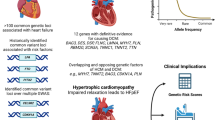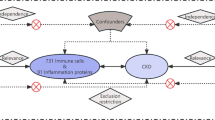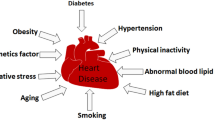Abstract
Background
Systemic low-grade inflammation is a prognostic risk factor of atrial fibrillation (AF).
Objective
We hypothesized that genetic polymorphisms, which determine the rate of inflammatory cytokines, are associated with the risk of AF, independently of comorbidity.
Methods and results
We included 192 patients with so-called lone AF and age 40 years or below, and 188 healthy controls. All patients were genotyped for single nucleotide polymorphisms (SNPs) in inflammatory genes using fluorescence-based real-time polymerase chain reaction (PCR). A case-control analysis of the C/C, C/T and T/T genotypes on IL1A-889 revealed a significant difference in both the frequency of genotypes (p = 0.03) and in the allelic frequency (p = 0.015). These differences were not significant after Bonferroni corrections. For IL1B-511, IL10-592, IL10-1082, IL18-137, IL18-607 and TNF-308 there were no significant differences, neither in genotype frequency, nor in allelic frequency between the lone AF patients and the controls.
Conclusion
Our study failed to show an association between polymorphisms in inflammatory genes and early onset of lone AF. It remains to be established whether polymorphisms in inflammatory genes play a causative role in the pathophysiology of AF.
Similar content being viewed by others
References
Kopecky SL, Gersh BJ, McGoon MD, Whisnant JP, Holmes DR Jr, Ilstrup DM, et al. The natural history of lone atrial fibrillation. A population-based study over three decades. N Engl J Med. 1987;317(11):669–74.
Wijffels MC, Kirchhof CJ, Dorland R, Allessie MA. Atrial fibrillation begets atrial fibrillation. A study in awake chronically instrumented goats. Circulation. 1995;92(7):1954–68.
Frustaci A, Chimenti C, Bellocci F, Morgante E, Russo MA, Maseri A. Histological substrate of atrial biopsies in patients with lone atrial fibrillation. Circulation. 1997;96(4):1180–4.
Chung MK, Martin DO, Sprecher D, Wazni O, Kanderian A, Carnes CA, et al. C-reactive protein elevation in patients with atrial arrhythmias: inflammatory mechanisms and persistence of atrial fibrillation. Circulation. 2001;104(24):2886–91.
Engelmann MD, Svendsen JH. Inflammation in the genesis and perpetuation of atrial fibrillation. Eur Heart J. 2005;26(20):2083–92.
Watanabe E, Arakawa T, Uchiyama T, Kodama I, Hishida H. High-sensitivity C-reactive protein is predictive of successful cardioversion for atrial fibrillation and maintenance of sinus rhythm after conversion. Int J Cardiol. 2006;108(3):346–53.
Kallergis EM, Manios EG, Kanoupakis EM, Mavrakis HE, Kolyvaki SG, Lyrarakis GM, et al. The role of the post-cardioversion time course of hs-CRP levels in clarifying the relationship between inflammation and persistence of atrial fibrillation. Heart. 2008;94(2):200–4.
Loricchio ML, Cianfrocca C, Pasceri V, Bianconi L, Auriti A, Calo L, et al. Relation of C-reactive protein to long-term risk of recurrence of atrial fibrillation after electrical cardioversion. Am J Cardiol. 2007;99(10):1421–4.
Henningsen KM, Nilsson B, Bruunsgaard H, Chen X, Pedersen BK, Svendsen JH (2008) Prognostic impact of hs-CRP and IL-6 in patients undergoing radiofrequency catheter ablation for atrial fibrillation. Scand Cardiovasc J 1–7 [Epub ahead of print].
Henningsen KM, Therkelsen SK, Bruunsgaard H, Krabbe KS, Pedersen BK, Svendsen JH. Prognostic impact of hs-CRP and IL-6 in patients with persistent atrial fibrillation treated with electrical cardioversion. Scand J Clin Lab Invest. 2009;69(3):425–32.
Aviles RJ, Martin DO, Apperson-Hansen C, Houghtaling PL, Rautaharju P, Kronmal RA, et al. Inflammation as a risk factor for atrial fibrillation. Circulation. 2003;108(24):3006–10.
Hatzinikolaou-Kotsakou E, Tziakas D, Hotidis A, Stakos D, Floros D, Papanas N, et al. Relation of C-reactive protein to the first onset and the recurrence rate in lone atrial fibrillation. Am J Cardiol. 2006;97(5):659–61.
Fuster V, Ryden LE, Cannom DS, Crijns HJ, Curtis AB, Ellenbogen KA, et al. ACC/AHA/ESC 2006 guidelines for the management of patients with atrial fibrillation: a report of the American college of Cardiology/American heart association task force on practice guidelines and the European society of cardiology committee for practice guidelines (writing committee to revise the 2001 guidelines for the management of patients with atrial fibrillation): developed in collaboration with the European heart rhythm association and the heart rhythm society. Circulation. 2006;114(7):e257–354.
Abazis-Stamboulieh D, Oikonomou P, Papadoulis N, Panayiotidis P, Vrakidou E, Tsezou A. Association of interleukin-1A, interleukin-1B and interleukin-1 receptor antagonist gene polymorphisms with multiple myeloma. Leuk Lymphoma. 2007;48(11):2196–203.
Dursun E, Gezen-Ak D, Ertan T, Bilgic B, Gurvit H, Emre M, et al. Interleukin-1alpha -889 C/T polymorphism in Turkish patients with late-onset Alzheimer’s disease. Dement Geriatr Cogn Disord. 2009;27(1):82–7.
Miteva L, Stanilova S. The combined effect of interleukin (IL)-10 and IL-12 polymorphisms on induced cytokine production. Hum Immunol. 2008;69(9):562–6.
Yu JT, Tan L, Song JH, Sun YP, Chen W, Miao D, et al. Interleukin-18 promoter polymorphisms and risk of late onset Alzheimer’s disease. Brain Res. 2009;1253:169–75.
Dinarello CA. Interleukin 1 and interleukin 18 as mediators of inflammation and the aging process. Am J Clin Nutr. 2006;83(2):447S–55S.
Teuffel O, Ethier MC, Beyene J, Sung L. Association between tumor necrosis factor-alpha promoter −308 A/G polymorphism and susceptibility to sepsis and sepsis mortality: a systematic review and meta-analysis. Crit Care Med. 2010;38(1):276–82
Yoon SZ, Jang IJ, Choi YJ, Kang MH, Lim HJ, Lim YJ, et al. Association between tumor necrosis factor alpha 308G/A polymorphism and increased proinflammatory cytokine release after cardiac surgery with cardiopulmonary bypass in the Korean population. J Cardiothorac Vasc Anesth. 2009;23(5):646–50.
Rodriguez S, Gaunt TR, Day IN. Hardy-Weinberg equilibrium testing of biological ascertainment for Mendelian randomization studies. Am J Epidemiol. 2009;169(4):505–14.
Chung MK, Martin DO, Sprecher D, Wazni O, Kanderian A, Carnes CA, et al. C-reactive protein elevation in patients with atrial arrhythmias: inflammatory mechanisms and persistence of atrial fibrillation. Circulation. 2001;104(24):2886–91.
Gaudino M, Andreotti F, Zamparelli R, Di CA, Nasso G, Burzotta F, et al. The -174G/C interleukin-6 polymorphism influences postoperative interleukin-6 levels and postoperative atrial fibrillation. Is atrial fibrillation an inflammatory complication? Circulation. 2003;108(Suppl 1):II195–9.
Kato K, Oguri M, Hibino T, Yajima K, Matsuo H, Segawa T, et al. Genetic factors for lone atrial fibrillation. Int J Mol Med. 2007;19(6):933–9.
Du Y, Dodel RC, Eastwood BJ, Bales KR, Gao F, Lohmuller F, et al. Association of an interleukin 1 alpha polymorphism with Alzheimer’s disease. Neurology. 2000;55(4):480–3.
Mrak RE, Griffin WS. Interleukin-1, neuroinflammation, and Alzheimer’s disease. Neurobiol Aging. 2001;22(6):903–8.
Licastro F, Pedrini S, Ferri C, Casadei V, Govoni M, Pession A, et al. Gene polymorphism affecting alpha1-antichymotrypsin and interleukin-1 plasma levels increases Alzheimer’s disease risk. Ann Neurol. 2000;48(3):388–91.
Grimaldi LM, Casadei VM, Ferri C, Veglia F, Licastro F, Annoni G, et al. Association of early-onset Alzheimer’s disease with an interleukin-1alpha gene polymorphism. Ann Neurol. 2000;47(3):361–5.
Bosco P, Gueant-Rodriguez RM, Anello G, Romano A, Namour B, Spada RS, et al. Association of IL-1 RN*2 allele and methionine synthase 2756 AA genotype with dementia severity of sporadic Alzheimer’s disease. J Neurol Neurosurg Psychiatry. 2004;75(7):1036–8.
Seripa D, Matera MG, Dal FG, Gravina C, Masullo C, Daniele A, et al. Genotypes and haplotypes in the IL-1 gene cluster: analysis of two genetically and diagnostically distinct groups of Alzheimer patients. Neurobiol Aging. 2005;26(4):455–64.
Combarros O, Sanchez-Guerra M, Infante J, Llorca J, Berciano J. Gene dose-dependent association of interleukin-1A [-889] allele 2 polymorphism with Alzheimer’s disease. J Neurol. 2002;249(9):1242–5.
Brosnan CF, Cannella B, Battistini L, Raine CS. Cytokine localization in multiple sclerosis lesions: correlation with adhesion molecule expression and reactive nitrogen species. Neurology. 1995;45(6 Suppl 6):S16–21.
Imamura K, Suzumura A, Hayashi F, Marunouchi T. Cytokine production by peripheral blood monocytes/macrophages in multiple sclerosis patients. Acta Neurol Scand. 1993;87(4):281–5.
Acknowledgments
The study was supported by grants from “The Danish Heart Foundation (08-10-R68-A2150-B841-22518)”, “The Research Foundation” at the Heart Centre at Rigshospitalet, “Rigshospitalets forskningsudvalg”, “Augustinus Fonden”, “Direktør Ib Henriksens Fond”, “Aase og Ejnar Danielsens Fond”, “Arvid Nilssons Fond”, “Lægernes Forskningsforening af 1891”, “Tove and John Girotti’s Fond”, “Direktør Kurt Bønnelycke og Hustru fru Grethe Bønnelyckes Fond”, “The John and Birthe Meyer Foundation” and “The Danish Arrhythmia Research Centre (DARC)”. The Centre of Inflammation and Metabolism is supported by a grant from the Danish National Research Foundation (# 02-512-55). The study was supported by unrestricted research grants from Biotronik Denmark, St. Jude Medical and Medtronic Denmark.
Author information
Authors and Affiliations
Corresponding author
Additional information
Responsible Editor: Andras Falus.
Rights and permissions
About this article
Cite this article
Henningsen, K.M.A., Olesen, M.S., Pedersen, M. et al. Single nucleotide polymorphisms in inflammatory genes and the risk of early onset of lone atrial fibrillation. Inflamm. Res. 59, 965–969 (2010). https://doi.org/10.1007/s00011-010-0210-8
Received:
Revised:
Accepted:
Published:
Issue Date:
DOI: https://doi.org/10.1007/s00011-010-0210-8




